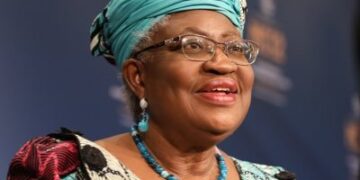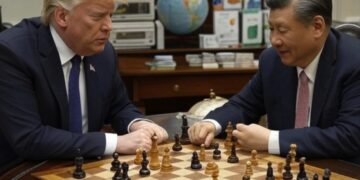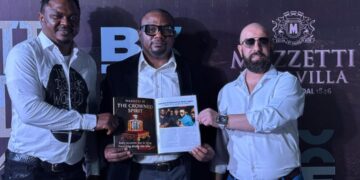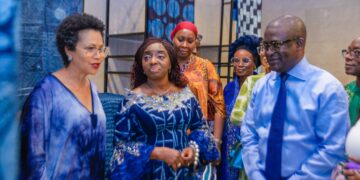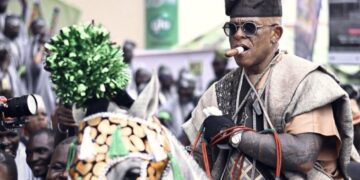In the heart of Nigerian celebrations—weddings, birthdays, and cultural festivals—a dazzling spectacle unfolds: guests shower crisp banknotes on dancers, musicians, and celebrants, a practice known as “money spraying.” This vibrant tradition, deeply rooted in Nigerian culture, is more than a flamboyant display of wealth; it is a symbol of joy, community, and support. While money spraying has long been a hallmark of Nigerian festivities, its influence is now crossing borders, subtly shaping cultural expressions in places like the United States. This article explores the origins, significance, and controversies of money spraying in Nigeria and its emerging impact on global celebratory practices.

The Roots of Money Spraying in Nigeria
Money spraying traces its origins to Nigeria’s Yoruba culture, where it began as a gesture of appreciation during joyous occasions. Historically, the practice is linked to praise poetry and oriki, where juju musicians would honor notable individuals with songs, and guests would respond by placing money on performers as a sign of respect and admiration. Historian Prof Tijjani Naniya notes that in the 1940s, families used money spraying as a discreet way to offer financial support to newlyweds, with guests placing cash in the groom’s pocket to ease the couple’s transition into married life. Over time, this evolved into the exuberant act of showering banknotes during lively dances, particularly during the oil boom of the 1960s, when Nigeria’s newfound wealth fueled extravagant displays of affluence.
The practice, most prominent among the Yoruba in Nigeria’s southwest, has spread across ethnic groups, including the Igbo, Hausa, Fulani, and others, becoming a national cultural norm. Today, money spraying is a staple of Nigerian “owambe” (extravagant parties), where guests compete to outdo each other, tossing crisp naira notes to signify status, generosity, and celebration. The act is not merely performative; it symbolizes prosperity, blessings, and communal support, often helping celebrants offset event costs or start new life chapters.
Cultural Significance and Modern Evolution
Money spraying carries deep cultural meaning. It is a tangible expression of goodwill, where guests shower celebrants with cash to wish them abundance and happiness. As one Nigerian wedding guest remarked, “I can’t imagine attending an event and not spraying money. It will look as if you don’t appreciate and love those celebrating.” Beyond weddings, the practice extends to birthdays, funerals, and cultural festivals, reinforcing social bonds and communal pride.
The rise of social media has amplified money spraying’s visibility, with viral videos showcasing extravagant displays at Nigerian events. This digital spotlight has not only entrenched the practice within Nigeria but also sparked curiosity abroad, particularly in diasporic communities. However, the tradition faces challenges at home. The Central Bank of Nigeria (CBN) and the Economic and Financial Crimes Commission (EFCC) have cracked down on money spraying, citing it as an abuse of the naira under Section 21 of the CBN Act of 2007, which prohibits actions like stepping on or defacing currency. Penalties include up to six months in prison or a fine of N50,000 (about $30). High-profile arrests, such as those of celebrities Bobrisky and Cubana Chief Priest in 2024, highlight the tension between cultural tradition and legal enforcement. Some Nigerians argue that the practice is a cherished expression of cultural pride, not a crime, while others see it as ostentatious, especially given Nigeria’s economic challenges.
To circumvent restrictions, some have turned to spraying foreign currencies like dollars, which are not covered by the naira-specific law, or discreetly placing money in envelopes or pockets. Despite these workarounds, the EFCC’s enforcement has led to behavioral shifts, with some attendees avoiding being filmed while spraying to evade prosecution.
Money Spraying’s Influence Abroad
The Nigerian diaspora, particularly in the United States, has carried money spraying across borders, introducing it to multicultural celebrations. In Nigerian American weddings, for instance, the practice has gained traction as a way to honor cultural heritage. A Nigerian Canadian bride planning a multicultural wedding in 2019 noted the challenge of explaining money spraying to non-Nigerian guests, emphasizing its role in fostering inclusivity and cultural exchange. Guests are often encouraged to participate by spraying small denominations, typically $1 or $5 bills, creating a festive atmosphere that blends Nigerian traditions with Western wedding customs.
This practice echoes the American “money dance,” where guests pin money on the bride or groom to dance with them, a tradition with roots in Polish and Slavic cultures. However, Nigerian money spraying is distinct in its exuberance and communal nature, often involving entire crowds rather than individual transactions. Social media has further bridged this cultural exchange, with videos of Nigerian-style money spraying at U.S. events inspiring curiosity and adoption. For example, a Reddit user planning to attend a Nigerian-American wedding in the U.S. expressed excitement about participating in money spraying, asking about appropriate denominations to use.
The influence extends beyond weddings. In American nightlife, particularly in hip-hop and African diaspora communities, “making it rain”—tossing cash in clubs—bears similarities to Nigerian money spraying. While some attribute “making it rain” to Black American culture, others suggest it may have been influenced by West African traditions, particularly through the Yoruba practice of pinning money on performers during festivals. The global rise of Afrobeats, led by Nigerian artists like Burna Boy and Wizkid, has further popularized Nigerian cultural elements, including money spraying, in Western entertainment spaces.
Controversies and Future Prospects
Money spraying is not without critics. In Nigeria, some view it as a display of wealth that exacerbates social inequality, with one observer noting, “It gives the illusion that our country is wealthy when, in fact, there are more poor people around.” Islamic clerics have also discouraged the practice, advocating for charitable giving instead. In the U.S., some perceive money spraying as a “cash grab,” raising etiquette concerns at multicultural events.
Yet, the tradition persists, evolving with modern sensibilities. Younger generations are adapting money spraying to align with digital trends, such as incorporating cashless transfers alongside traditional spraying. As Nigeria’s cultural influence grows through its music, fashion, and film industries, money spraying is likely to find new expressions abroad, particularly in diasporic communities.
Nigeria’s money-spraying tradition is a vibrant testament to the country’s cultural richness, blending celebration, generosity, and communal support. While it faces legal and social challenges at home, its influence is spreading, particularly in the United States, where it enriches multicultural celebrations and resonates with similar customs. As globalization and social media continue to amplify Nigerian culture, money spraying may evolve further, balancing tradition with modernity. For now, it remains a powerful symbol of joy and solidarity, reminding us that culture, like money, knows no borders when shared with love.







